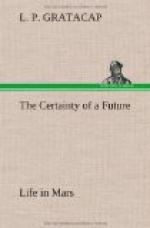“Yes,” she answered. “Aren’t you a good nurse?”
“Oh, I think you need not misunderstand me,” I insisted.
“Misunderstanding is rather an English trait, you Americans say,” she retorted.
“But in this case,” I continued, “I hoped any disadvantages of that sort would be overcome by your own feelings.”
She blushed and looked quite dauntlessly into my eyes: “You mean,” she inquired, “that you are sorry to leave me?”
My face was very red, I knew, and I felt a puzzling sensation in my throat, but I did not hesitate: “Of course, I am sorry to leave you, more sorry than I can say, but I fear more, that leaving you may mean losing you.”
This time confusion seemed struggling with a pleased mirth in her face, and with a laugh and a quick movement toward the stairway she exclaimed: “Well, Americans, they say, never lose what they really care to win.”
I darted forward, but she was too quick for me and the chase ended in the lower hall in a group of people—her parents, my father, visitors and servants—and I saw her disappear with a backward glance, in which, I could swear, I saw two pouting lips.
My father was overjoyed to return to our really very comfortable quarters on “Martian Hill,” as Mr. Dodan, in reference to my father’s infatuation over his imaginary (?) population of Mars, was accustomed to call our professional home.
It was, I think, only a few weeks after this that my father called me to his room. He was standing in his morning apparel, a strange garb which he sometimes affected, made up of a black velvet gown brought together at the waist by a stout yellow cord, a bright red skull cap, a sort of sandal shoe, picked out with silver ornaments, his arms covered with loose, puckered sleeves of lace, dotted with black extending up to the close fitting sleeves of the velvet gown which only descended to his elbow. Beneath the gown, when he was thus theatrically attired, he wore a shirt of pale blue silk with a flat collar, over which came a black vest meeting his black trunks and blue hose.
My father was a really striking and beautiful picture in his incongruous habiliment. His strong and thoughtful face, over which yet clustered the curly hair of boyhood, just touched with gray, lit up by his earnest, sad eyes, seemed—how distinctly I recall it—almost ideally lovely that morning, and I compared him in my thoughts with the father of Romola, only as wearing a more youthful expression. He was seated when I came in, and as his eyes encountered mine, I detected the traces of tears upon his cheeks. My heart was full of love for my father, or childlike adoration it might have been called. I hurried to him and embraced him. The tenderness overcame his habitual self-restraint and he seemed to fall sobbing in my arms.
“My son,” he finally whispered, “my days are drawing very fast to a close. The shock I experienced at Christ Church prepared me to believe I would die in some attack of paralysis. A slight aphasia occurred this morning. It, too, as suddenly disappeared. But these warnings cannot be neglected. I and you must at once make preparations for that future colloquy which we must endeavor to establish between ourselves, when I have left this earth and you yet remain upon it.




